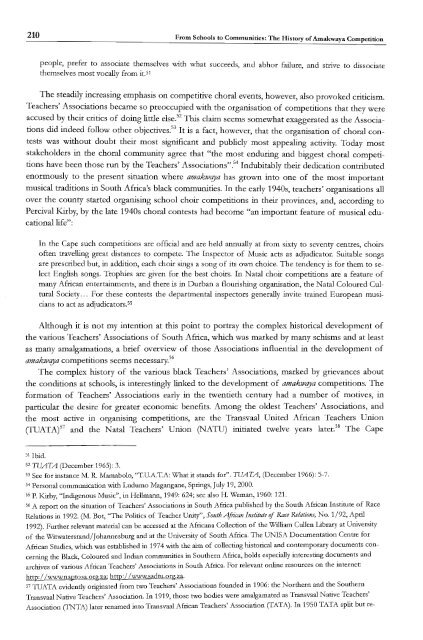South African Choral Music (Amakwaya): Song, Contest and the ...
South African Choral Music (Amakwaya): Song, Contest and the ...
South African Choral Music (Amakwaya): Song, Contest and the ...
You also want an ePaper? Increase the reach of your titles
YUMPU automatically turns print PDFs into web optimized ePapers that Google loves.
210 From Schools to Communities: The History of<strong>Amakwaya</strong> Competition<br />
people, prefer to associate <strong>the</strong>mselves with what succeeds, <strong>and</strong> abhor failure, <strong>and</strong> strive to dissociate<br />
<strong>the</strong>mselves most vocally from it. 51<br />
The steadily increasing emphasis on competitive choral events, however, also provoked criticism.<br />
Teachers' Associations became so preoccupied with <strong>the</strong> organisation of competitions that <strong>the</strong>y were<br />
accused by <strong>the</strong>ir critics of doing little else. 52 This claim seems somewhat exaggerated as <strong>the</strong> Associa<br />
tions did indeed follow o<strong>the</strong>r objectives. 53 It is a fact, however, that <strong>the</strong> organisation of choral con<br />
tests was without doubt <strong>the</strong>ir most significant <strong>and</strong> publicly most appealing activity. Today most<br />
stakeholders in <strong>the</strong> choral community agree that "<strong>the</strong> most enduring <strong>and</strong> biggest choral competi<br />
tions have been those run by <strong>the</strong> Teachers' Associations".54 Indubitably <strong>the</strong>ir dedication contributed<br />
enormously to <strong>the</strong> present situation where amakwqya has grown into one of <strong>the</strong> most important<br />
musical traditions in <strong>South</strong> Africa's black communities. In <strong>the</strong> early 1940s, teachers' organisations all<br />
over <strong>the</strong> county started organising school choir competitions in <strong>the</strong>ir provinces, <strong>and</strong>, according to<br />
Percival Kirby, by <strong>the</strong> late 1940s choral contests had become "an important feature of musical edu<br />
cationallife":<br />
In <strong>the</strong> Cape such competitions are official <strong>and</strong> are held annually at from sixty to seventy centres, choirs<br />
often travelling great distances to compete. The Inspector of <strong>Music</strong> acts as adjudicator. Suitable songs<br />
are prescribed but, in addition, each choir sings a song of its own choice. The tendency is for <strong>the</strong>m to select<br />
English songs. Trophies are given for <strong>the</strong> best choirs. In Natal choir competitions are a feature of<br />
many <strong>African</strong> entertainments, <strong>and</strong> <strong>the</strong>re is in Durban a flourishing organisation, <strong>the</strong> Natal Coloured Cultural<br />
Society... For <strong>the</strong>se contests <strong>the</strong> departmental inspectors generally invite trained European musicians<br />
to act as adjudicators. 55<br />
Although it is not my intention at this point to portray <strong>the</strong> complex historical development of<br />
<strong>the</strong> various Teachers' Associations of <strong>South</strong> Africa, which was marked by many schisms <strong>and</strong> at least<br />
as many amalgamations, a brief overview of those Associations influential in <strong>the</strong> development of<br />
. . 56<br />
amak wqya compennons seems necessary.<br />
The complex history of <strong>the</strong> various black Teachers' Associations, marked by grievances about<br />
<strong>the</strong> conditions at schools, is interestingly linked to <strong>the</strong> development of amakwqya competitions. The<br />
formation of Teachers' Associations early in <strong>the</strong> twentieth century had a number of motives, in<br />
particular <strong>the</strong> desire for greater economic benefits. Among <strong>the</strong> oldest Teachers' Associations, <strong>and</strong><br />
<strong>the</strong> most active in organising competitions, are <strong>the</strong> Transvaal United <strong>African</strong> Teachers Union<br />
(TUATA)57 <strong>and</strong> <strong>the</strong> Natal Teachers' Union (NATU) initiated twelve years later.58 The Cape<br />
51 Ibid.<br />
52 TUATA (December 1965): 3.<br />
53 See for instance M. R. Mamabolo, "T.UA.T.A: What it st<strong>and</strong>s for". TUATA, (December 1966): 5-7.<br />
54 Personal communication with Ludumo Magangane, Springs,]uly 19, 2000.<br />
55 P. Kirby, "Indigenous <strong>Music</strong>", in Hellmann, 1949: 624; see also H. Weman, 1960: 121.<br />
56 A report on <strong>the</strong> situation of Teachers' Associations in <strong>South</strong> Africa published by <strong>the</strong> <strong>South</strong> <strong>African</strong> Institute of Race<br />
Relations in 1992. (M. Bot, "The Politics of Teacher Unity", <strong>South</strong> <strong>African</strong> Institute if Race Relations, No. 1/92, April<br />
1992). Fur<strong>the</strong>r relevant material can be accessed at <strong>the</strong> <strong>African</strong>a Collection of <strong>the</strong> William Cullen Library at University<br />
of <strong>the</strong> Witwatersr<strong>and</strong>/]ohannesburg <strong>and</strong> at <strong>the</strong> University of <strong>South</strong> Africa. The UNISA Documentation Centre for<br />
<strong>African</strong> Studies, which was established in 1974 with <strong>the</strong> aim of collecting historical <strong>and</strong> contemporary documents con<br />
cerning <strong>the</strong> Black, Coloured <strong>and</strong> Indian communities in <strong>South</strong>ern Africa, holds especially interesting documents <strong>and</strong><br />
archives of various <strong>African</strong> Teachers' Associations in <strong>South</strong> Africa. For relevant online resources on <strong>the</strong> internet:<br />
http://www.naptosa.org.za; http://www.sadtu.org.za.<br />
57 TUATA evidently originated from two Teachers' Associations founded in 1906: <strong>the</strong> Nor<strong>the</strong>rn <strong>and</strong> <strong>the</strong> <strong>South</strong>ern<br />
Transvaal Native Teachers' Association. In 1919, those two bodies were amalgamated as Transvaal Native Teachers'<br />
Association (TNTA) later renamed into Transvaal <strong>African</strong> Teachers' Association (TATA). In 1950 TATA split but re-

















